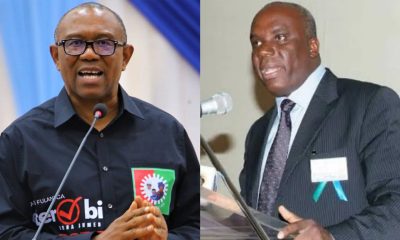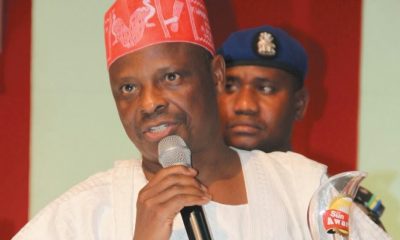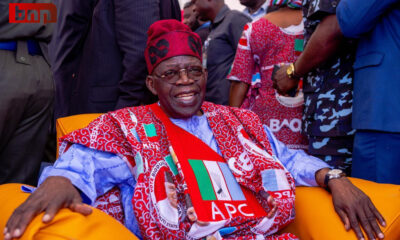Politics
Ex-Borno Governor Shettima to be presented to Buhari today as APC vice-presidential candidate – Sources

Former Borno State Governor Senator Kashim Shettima will today, Sunday July 10, be presented to President Muhammadu Bihari as the running mate of the All Progressives Congress presidential candidate for the 2023 polls, Asiwaju Bola Ahmed Tinubu.
Reliable sources in the Bola Ahmed Tinubu Campaign Organisation confirmed Shettima had been chosen as Tinubu’s running mate after initial dispute among leaders of the party on who is the most suitable for the position.
The News Agency of Nigeria also reported in one of its bulletins on Sunday that the vice presidential candidate would be unveiled to President Muhammadu Buhari, who is the leader of the party in his hometown in Daura, Katsina State on Sunday (today).
President Buhari has been in Daura since Friday for the Eid-el Kabir celebration.
He is expected to return to Abuja on Thursday.
Before now, the party had submitted the name of Kabir Masari, who is from Katsina State, as a placeholder vice presidential candidate.
Eagle Online also reported on Sunday that Shettima would be unveiled to Buhari on Sunday before his name is made public during the week.
He played prominent role in the pre-presidential primaries campaign of Tinubu and has remained visible with the former Lagos State Governor since then.
Shettima, the representative of Borno Central Senatorial District, was a former two-term Governor of Borno State.
He held sway as Governor of Borno State between 2011 and 2019.
He was born on September 2, 1966 in Maiduguri, the Borno State capital, to the family of Sir Kashim Ibrahim.
He is married to Nana Shettima and they have three children: two females and a male.
He speaks English and Hausa fluently.
According to Wikipedia: Shettima attended Lamisula Primary School in Maiduguri from 1972 to 1978; Government Community Secondary School, Biu in southern part of Borno State from 1978 to 1980; transferred to Government Science Secondary School, Potiskum (now in neighbouring Yobe State), where he completed his secondary education in 1983.
He studied at the University of Maiduguri and earned a Degree (BSc) in Agricultural Economics in 1989.
He had his one-year compulsory membership of the National Youths Service Corps at the defunct Nigerian Agricultural Cooperative Bank, Calabar, capital of Cross River State, in South South, Nigeria from 1989 to 1990.
He obtained a Master’s degree (MSc) in Agricultural Economics in 1991 at the University of Ibadan in South West, Nigeria.
Shettima joined the University of Maiduguri as a Lecturer with the Department of Agricultural Economics and was in the academia from 1991 to 1993.
In 1993, he moved into the banking sector and was employed by the now defunct Commercial Bank of Africa Limited as head of accounts unit at the bank’s office in Ikeja, Lagos State, South West, Nigeria.
Shettima was there from 1993 to 1997.
In 1997, he crossed over to the African International Bank Limited as a Deputy Manager and rose to become a Manager in 2001.
In 2001, he moved to the Zenith Bank as head of its main branch in Maiduguri.
At Zenith Bank, he rose to Senior Manager/Branch Head; Assistant General Manager (AGM)/Zonal Head (North East) and Deputy General Manager/Zonal Head (North East) before he stepped out of the Zenith Bank as a General Manager in 2007 following his appointment as Commissioner for Finance in Borno State.
Shettima worked with the Commercial Bank of Africa as an Agricultural Economist at its Ikeja Office, Lagos State (1993-1997).
He then became a Deputy Manager, later Manager, at African International Bank Limited, Kaduna Branch (1997–2001), and was appointed Deputy Manager/Branch Head of Zenith Bank’s Maiduguri Office in 2001, becoming General Manager five years later.
In mid-2007, Shettima was appointed Commissioner, Borno State Ministry of Finance and Economic Development.
Later he became Commissioner in the Ministries of Local Governments and Chieftaincy Affairs, Education, Agriculture and later Health under his predecessor as Borno State Governor, Ali Modu Sheriff.
From 2007 to 2011, he served as Commissioner in five Ministries.
In the January 2011 primaries of the All Nigeria Peoples Party, Engineer Modu Fannami Gubio was selected as candidate for the governorship poll.
However, Gubio was later shot dead by gunmen, and Shettima was selected in a second primary in February 2011.
In the April 26, 2011 elections, Shettima won with 531,147 votes, while the Peoples Democratic Party candidate, Muhammed Goni, gained 450,140 votes.
He was Commissioner of Local Governments and Chieftaincy Affairs (2008), Education (2009), Agriculture and Natural Resources and finally to the Ministry of Health from where he contested the governorship in 2011, which he won on the platform of the now defunct ANPP.
He was inaugurated on May 29, 2011.
He won reelection in 2015 on the platform of the All Progressives Congress and was chosen as the Chairman of the Northern States Governors’ Forum, an umbrella body of Governors in the 19 States located in northern Nigeria.
As Governor of Borno State, he has efficiently managed challenges arising from the Boko Haram insurgency which he inherited in 2011.
With the approval of the National Security Adviser and the Nigerian Army in 2013, his government formalised the establishment of youth volunteers called the Civilian Joint Task Force.
The volunteers have played very significant role in supporting the military in ongoing fight against Boko Haram insurgents.
He approved salaries, kits and patrol vehicles for the civilian JTF, while at the same time giving so much support to the Nigerian Armed Forces.
He leads in mobilisation of community-based intelligence gathering and the provision of hundreds of patrol vehicles and material logistics to the military in particular and to all other security agencies.
In September, 2014, Maiduguri, the seat of Government became very vulnerable to being occupied by insurgents.
The fear was so intense that notable residents relocated their families to Abuja.
However, amidst such fright, then Governor Shettima, who was out of the country for an official assignment, returned to Maiduguri in a show of courage and patriotism.
On his return, the former governor mobilised residents towards rising up in defence of their ancestry.
Although Maiduguri didn’t fall, the insurgents succeeded in occupying 20 out of the 27 local government areas of the State before the Nigerian Armed Forces liberated them between 2015 and 2016.
Former Governor Shettima’s leadership credentials have attracted positive recognition within and outside Nigeria.
In February, 2019 he became the winner of the Borno Central Senatorial District election, replacing Senator Babakaka Bashir.
Politics
CNPP urges opposition to unite against Tinubu’s second term

CNPP urges opposition to unite against Tinubu’s second term
The Conference of Nigeria Political Parties (CNPP) has sounded a warning over the fractured state of Nigeria’s opposition parties, cautioning that their lack of unity could allow President Bola Ahmed Tinubu’s All Progressives Congress (APC) to retain power in the 2027 general elections.
In a statement issued by Comrade James Ezema, the CNPP’s Deputy National Publicity Secretary, the organization expressed fears that Nigeria may drift towards a one-party state if opposition parties fail to align their efforts.
“The opposition parties are currently working at cross-purposes, scheming to undo each other ahead of the 2027 presidential election,” Ezema said. “This lack of unity and focus is detrimental to the democratic process and the future of Nigeria.”
The CNPP also advocated for a rotational presidency, emphasizing the need for each of Nigeria’s six geopolitical zones to have a constitutionally guaranteed turn at the presidency. The group believes such a system would promote fairness and ensure stability.
“The presidency must rotate between the northern and southern regions to ensure equitable representation,” Ezema stated. “This is crucial for the long-term stability of our nation.”
READ ALSO:
- 25-year-old man arrested for allegedly kidnapping minor in Kano
- Protest in Ondo community over plans to impose monarch
- Osimhen scores 10th goal as Galatasaray beat Goztepe 2-1
The CNPP underscored the importance of unity among opposition parties if they hope to challenge the APC effectively. “The opposition that can win the 2027 presidential election must be united, strong, focused, purposeful, and daring,” Ezema stressed.
“They must demonstrate a commitment greater than what the APC displayed in 2014.” he noted.
Ezema further described the APC as “a very hard nut for the opposition to crack,” warning that a divided opposition would make the ruling party’s victory inevitable.
While acknowledging President Tinubu’s New Year message, the CNPP urged the President to go beyond rhetoric. “Words alone are not enough. The President must take concrete steps to address the pressing issues facing the nation,” Ezema said
The CNPP called on opposition parties to bury their differences and form a united front to safeguard Nigeria’s democracy. “Unity is not just desirable; it is essential,” Ezema concluded.
As the 2027 elections draw closer, the CNPP’s statement serves as a stark reminder of the stakes involved and the urgent need for political cohesion among opposition parties.
CNPP urges opposition to unite against Tinubu’s second term
Politics
2027: Kwankwaso slams northern elders over choice of candidates

2027: Kwankwaso slams northern elders over choice of candidates
The 2023 presidential candidate of the New Nigeria Peoples Party (NNPP), Senator Rabiu Musa Kwankwaso, has again commented on the next presidential election, coming up in 2027.
The former Kano State Governor expressed his discontent with individuals which he said claimed to be Northern leaders, who interfere in the selection of candidates, especially for the presidency, under the guise of representing the region.
Kwakwanso made the remarks in an interview with the BBC Hausa Service. He stated that such actions cause division among the people, disrupt democracy, and, most importantly, lead to the election of unqualified leaders.
READ ALSO:
- How I escaped death after my 14-year-old bride poisoned my meal – Jigawa man
- APC diaspora rejects group’s ranking Tinubu among most corrupt leaders
- Tinubu to Enugu Gov: You’re a good thinker
He emphasized that the lessons from past elections should serve as a warning to these so-called leaders, urging them to steer clear of interfering in candidate selection and imposing their will on the people.
Kwankwaso also emphasized that Northern elders, particularly those from the Northwest, should refrain from displaying favouritism in the selection of candidates.
It will be recalled that some time ago, the former governor dismissed rumours of an agreement between himself and former presidential candidates Atiku Abubakar and Peter Obi of the Labour Party, suggesting that each would serve a specific term in office.
Kwakwanso came fourth behind the eventual winner, President Bola Tinubu, Atiku and Obi, in the 2023 polls.
2027: Kwankwaso slams northern elders over choice of candidates
Politics
APC diaspora rejects group’s ranking Tinubu among most corrupt leaders

APC diaspora rejects group’s ranking Tinubu among most corrupt leaders
The former Secretary of the Committee of APC Diaspora Chairmen, Mr Ayoola Lawal has condemned the inclusion of President Bola Tinubu in the recent global corruption ranking by the Organised Crime and Corruption Reporting Project (OCCRP).
READ ALSO:
APC diaspora rejects group’s ranking Tinubu among most corrupt leaders
-

 metro2 days ago
metro2 days agoYouths beat Osun monarch for appointing Imam
-

 Business2 days ago
Business2 days agoPetrol price may crash to N500/litre, say marketers
-

 Business2 days ago
Business2 days agoMeta deletes AI accounts after backlash over posts
-
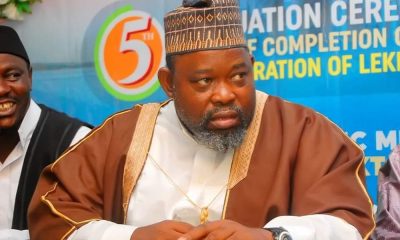
 metro3 days ago
metro3 days agoMosques should be research centres – Varsity don
-

 Entertainment2 days ago
Entertainment2 days agoKano suspends Kannywood actress over indecent dressing, provocative content
-
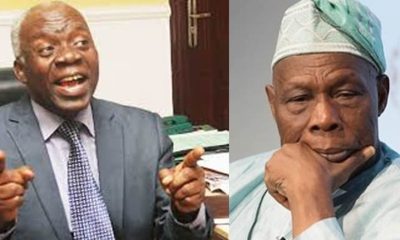
 metro2 days ago
metro2 days agoYar’Adua stopped refinery sale to Dangote over due process, paltry amount – Falana replies Obasanjo
-

 metro3 days ago
metro3 days agoEdo LG chairman, 8 councillors, defect to APC
-

 metro3 days ago
metro3 days agoDrunk police officer ‘frees’ 13 suspects to celebrate new year

